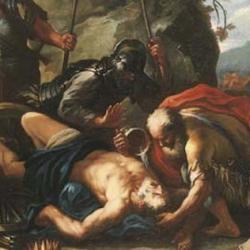After he recounts Yahweh’s commitment to the Davidic line (1 Chronicles 17), the Chronicler recounts David’s conquests (ch. 18). David strikes to the west (Philistia, v. 1) and east (Moab, v. 2; Aram, vv. 3-8), and Abishai later follows up with an annexation of Edomite territory to the south (vv. 12-13). David spreads out his kingdom in nearly every direction.
In each case, he takes plunder. Moab becomes a tributary state to Israel (v. 2), bringing minchot just as Israelites brought minchot to the Lord’s house (Leviticus 2; the word translated as “grain offering” is minchah, “tribute”). David wrests plunder from Hadadezer of Zobah (v. 4), and the Arameans of Damascus become a tributary people like the Moabites (v. 6). David consecrates the spoils to the Lord, the gold, silver, and bronze kept in reserve for his son who would build a house for Yahweh’s name.
David’s conquests elicit voluntary tribute from Tou, king of Hamath (vv. 9-10). Tou had been at war with Hadadezer, and when David defeats the latter he liberated the former. Nations are bringing their treasures to Jerusalem, but most of them are doing it unwillingly. Tou gives foretaste of a future pilgrimage of nations and kings who will adorn Zion because their spirits are stirred (e.g., Cyrus).
Much of the chapter turns on the word “help” (Heb. ‘azar). Given his name, you’d expect Hadadezer (Hadad helps) of Damascus to turn for help to Hadad (the storm god, Baal, Zeus, Jupiter). He never does. Instead, the Arameans of Damascus come to help (v. 5) but they don’t help much, because David kills 22,000 of them (v. 5; or perhaps 22 “companies”).
It’s not that you can’t find good help. David can; the Lord helps him (vv. 6, 13). In David’s case, the verb isn’t ‘azar but yasha, “save.” Yahweh “saves” David wherever he goes. Yahweh proves a true Joshua, a Jeshua to David and Israel. He is the God who helps.















